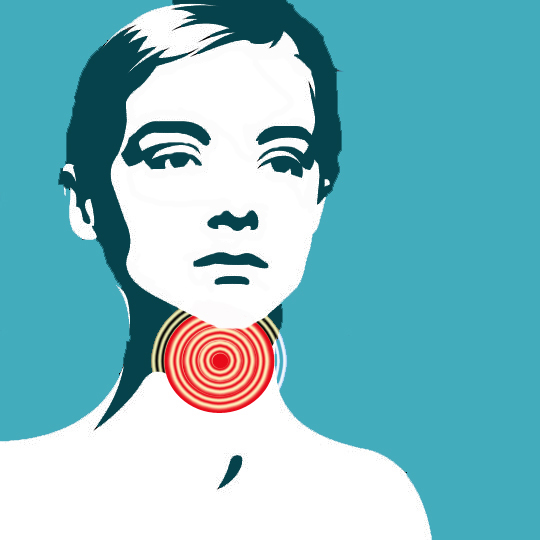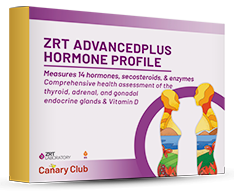Don't Have Enough Vitality? Let's Look at Your Thyroid
Do you have enough vitality to enjoy your life? When your hormones are in balance, you feel good in your body, your mind is at peace, and you have the energy and desire to engage with life. Your thyroid-related hormones play a crucial role in how much energy you have, so when you consistently feel listless, run-down, and lifeless perhaps it's time to test your thyroid.
Thyroid—Like the 'Accelerator' in Your Car
There are over a dozen hormone-producing glands in your body.  Collectively these glands are one part of the endocrine system.
Collectively these glands are one part of the endocrine system.
Your thyroid is one of these endocrine glands and plays a dominant role in your body's metabolism and balance. It delivers energy as needed to control the metabolic rate of your heart, muscle, digestive functions, brain development, and bone maintenance. Think of pushing down on the accelerator in your car.
Pushing down increases the energy for the motor to move the car faster. Pulling off decreases the available energy. Your thyroid works with the energy in your body in a similar way.
A Comprehensive Look at Your Thyroid
Due to its significant role in your overall vitality, the ZRT Comprehensive Thyroid and Elements Profile is designed to analyze the main contributors to thyroid dysfunction:
- Thyroid hormones. These thyroid-related hormones are analyzed from your blood spot sample: free triiodothyronine (fT3), free thyroxine (fT4), thyroxine (T4), thyroid-stimulating hormone (TSH), and thyroglobulin (Tgbn)
- free triiodothyronine (free T3 or fT3) test is primarily to help your physician diagnose hyperthyroidism and may help monitor the treatment of a person with a known thyroid disorder.
- free thyroxine (free T4 or fT4) tests are used to help your practitioner evaluate thyroid function and diagnose thyroid diseases, including hyperthyroidism and hypothyroidism, usually after discovering that the thyroid-stimulating hormone (TSH) level is abnormal
- thyroxine (T4) test is used to help your practitioner evaluate thyroid function and diagnose thyroid disease.
- Thyroid-stimulating hormone (TSH) is a pituitary hormone that stimulates the thyroid gland to produce thyroxine (T4), and then triiodothyronine (T3) which stimulates the metabolism of almost every tissue in the body.
- Thyroglobulin (Tgbn) acts as a substrate for the synthesis of the thyroid hormones thyroxine (T4) and triiodothyronine (T3), as well as the storage of the inactive forms of thyroid hormone and iodine within the thyroid.
- Thyroid autoimmune antibodies. These thyroid-related antibodies are analyzed from your blood spot sample:
- autoantibodies to thyroid peroxidase (TPOAb) The presence of these thyroid-related antibodies reflect a prior attack on the thyroid tissue by the body's immune system.
- autoantibodies to thyroid peroxidase (TPOAb) The presence of these thyroid-related antibodies reflect a prior attack on the thyroid tissue by the body's immune system.
- Nutritional Elements (Essential Elements). These elements deemed essential to your health, coming usually from nutrition, are analyzed from your dried urine sample: Iodine (I), Selenium (Se), Bromine (Br), Lithium (Li)
- Iodine and selenium can be beneficial or toxic, depending on their levels. Deficiency or excess can cause thyroid dysfunction and goiter.
Your thyroid needs a good supply of iodine from your diet. Cells producing thyroid hormones are specialized in extracting and absorbing iodine from the blood and incorporating them into the thyroid hormones.
Iodine is an essential component of the thyroid hormones T4 and T3, iodine is commonly found in dairy products, seafood, iodized salt, and grains.
Iodine deficiency compromises thyroid hormone production and leads to serious diseases including irreversible cretinism (a condition characterized by physical deformity and learning disabilities that are caused by thyroid deficiency), pregnancy complications, goiter, and decreased cognitive function.
Iodine deficiency has also been associated with breast cancer. - Bromine is in the same chemical family as iodine and excessive amounts will compete with iodine in the thyroid – becoming particularly problematic when iodine levels are low and bromine is high. Bromine is a common component of flameproofing agents, fumigants, medications, “Iodine deficiency compromises thyroid hormone production and leads to serious diseases including irreversible cretinism, pregnancy complications, goiter, and decreased cognitive function.”, food products, and pool/spa sanitizers. High environmental exposure can lead to excess accumulation. If iodine status is low, bromine can interfere with thyroid hormone synthesis.
- Lithium was historically used to treat mood disorders, lithium is now known to play a positive role in overall health. In particular, it restores nerve function and improves brain health. When lithium levels in the water supply are too low, increased suicide rates have been found in studies.
- Iodine and selenium can be beneficial or toxic, depending on their levels. Deficiency or excess can cause thyroid dysfunction and goiter.
- Heavy Metals. These heavy metals, deemed toxic to your health, are analyzed from your dried urine sample: Arsenic (As), Cadmium (Cd), Mercury (Hg). The lab also reports on your Creatine (Crtn) level.
Testing Your Thyroid
Thyroid health can be undermined by overexposure to toxic heavy metals, such as arsenic, cadmium, and mercury.
In other situations, nutrients from our food deemed essential to the proper functioning of the thyroid can cause problems. Iodine and selenium can be problematic when too high or too low. Iodine and Bromine compete with each other in proper thyroid functioning.
To obtain a comprehensive overview of the health of the thyroid, it’s important to measure thyroid markers like TSH, fT3, fT4, and TPO, along with the heavy metals and essential elements when trying to assess whether a person has impaired thyroid function.
Why Test for Thyroid Hormones?
There are several disorders associated with the thyroid gland, with most problems concerning the production of thyroid hormones. Either the thyroid gland produces too much hormone (hyperthyroidism) or your thyroid doesn't produce enough hormone (hypothyroidism), resulting in your body using energy faster or slower than it should.
Hormones secreted by the pituitary gland (TSH) stay constant in your blood circulation, but their levels may increase or decrease when T4 levels in the blood are changing. This hypothalamic-pituitary-thyroid feedback loop keeps the levels of T4 in your blood stable and reacts to small changes immediately.
What are the typical symptoms of hyper- and hypothyroidism?
Typical symptoms of hyperthyroidism are weight loss, fast heart rate, high irritability/nervousness, muscle weakness and tremors, infrequent menstrual periods, sleep problems, eye irritations, and heat sensitivity.
Symptoms of hypothyroidism are the opposite of hyperthyroidism, such as weight gain, slower heart rate, fatigue, more frequent and stronger menstrual periods, forgetfulness, dry skin and hair, hoarse voice, and intolerance to cold. In addition, hypothyroidism is often accompanied by an enlargement of the thyroid gland known as goiter.
The only way to know if thyroid hormones are in balance is to test them.
Why Test Your Thyroid Exposure to Toxic Heavy Metals or Essential Elements?
One gland profoundly affected by pollutants is the thyroid.
Arsenic, mercury, and cadmium are three of the most toxic heavy metals, according to the CDC.
Environmental pollutants are all around us—in the air we breathe, in the water we drink, in the food we eat, and in materials we touch. These pollutants can significantly increase our risk of developing conditions like dementia, infertility, diabetes, and cancer. They are also known to cause damage to the liver, kidneys, and brain, as well as the cardiovascular, nervous, and endocrine systems. In excess, and when persistent, they can affect the synthesis and actions of hormones essential for managing our general health.
Essential elements, overall only healthy when they are within optimal ranges. Levels too low or too high can have detrimental effects on health. Therefore, it’s important to know if essential or toxic elements are outside their optimal ranges.
Who Benefits from Elements Testing?
- Smokers
- people exposed to heavy metals through hobbies or dentistry
- those with health issues that could have resulted from nutritional deficiencies or imbalances in essential elements
- residents of older homes or areas where toxins may be present in drinking water
Your Thyroid Management Testing Plan
When you know you have done everything you can to feel energetic and engaged with your life—yet continue to feel lethargic, and spiritless—it is time to consider testing your thyroid.
- Step 1: Start by selecting the ZRT Comprehensive Thyroid and Elements Profile, using the guide below.
- Step 2: Take the test to establish the starting thyroid hormone, essential/nutritional elements, and toxic heavy metals baseline at the onset of your plan. Consider developing your plan alongside:
- a licensed health care provider for medical conditions, especially for severe "out of normal range" results
- or a health care consultant for nutrition and supplements that will support your results
- Step 3: Develop a plan based on your lab test results, establishing a one-year or more outlook.
- Be diligent to address the factors you can, such as work stress, poor diet, and lack of exercise.
- Keep logs of your intakes, and daily routines related to your hormone test results.
- Step 4: After 6-12 months of actively working on your plan, take the same test again, or take a smaller panel that tests specific areas of concern to determine your progress.
Our ZRT Comprehensive Thyroid and Elements Profile can help you assess factors influencing your thyroid.
ZRT Comprehensive Thyroid and Elements Profile (Report)
Additional Resources
ZRT AdvancedPlus Profile
This innovative combination, recommended by Dr. Richard Shames, MD, Dr. Richard Shames, MD, is a specialist in endocrinology hormones. Practices as a Consulting Physician and Personal Health Coach, focusing on thyroid and adrenal disorders and their many related conditions, offers a more cost-effective assessment of the major hormones produced by the thyroid, adrenal, and gonad glands, along with an evaluation of Vitamin D levels. This consolidated approach streamlines the testing process offering greater value
- Sex steroid hormones (in saliva): Estradiol (E2), Progesterone (Pg), and Testosterone (T)
- Adrenal Hormones (in saliva): DHEA-S (DS), Diurnal Cortisol (sampled 4x to show your full daily cortisol cycle)
- Thyroid hormones (in blood spot): TSH, fT3, fT4, TPOab
- Vitamin D (in blood spot): 25-OH, Total (D2, D3)



